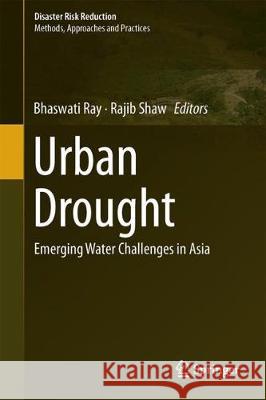Urban Drought: Emerging Water Challenges in Asia » książka



Urban Drought: Emerging Water Challenges in Asia
ISBN-13: 9789811089466 / Angielski / Twarda / 2019 / 427 str.
Urban Drought: Emerging Water Challenges in Asia
ISBN-13: 9789811089466 / Angielski / Twarda / 2019 / 427 str.
(netto: 500,72 VAT: 5%)
Najniższa cena z 30 dni: 501,19
ok. 16-18 dni roboczych.
Darmowa dostawa!
This book presents water insecurity issues in urban areas while developing a water security index and explores the innovative approaches to water development and management with examples from Asian cities.
Chapter 1. Defining Urban Water Insecurity: Concepts and Relevance
Bhaswati Ray and Rajib Shaw
Chapter 2. Water Insecurity in Asian Cities
Bhaswati Ray and Rajib Shaw
Chapter 3. Climate Change: Implication on Urban Drought
Bhaswati Ray and Rajib Shaw
Chapter 4. Developing Water Security Index for Urban Areas
Bhaswati Ray and Rajib Shaw
Chapter 5. Water Energy Food Nexus: A Provision to Tackle Urban Drought
Bijon Kumer Mitra, Rajib Shaw, Wanglin Yan and Tomoko Minowa
Chapter 6. Coping with Scarcity and Urban Water Governance: Case of Udon Thani’s City Region
Wijitbusaba (Ann) Marome
Chapter 7. Bridging the Distances between Far Water and Near Water: Case of Yanagawa City from Japan
Shimpei Iwasaki
Chapter 8. Resilience to Water Related Disaster: Risks, Vulnerabilities and Coping Strategies in Dhaka
Md. Anwarul Abedin and Mohammad Golam Kibria
Chapter 9. Resilience Perspective for Planning Urban Water Infrastructure: A Case of Nagpur City
Sameer Deshkar
Chapter 10. Urban Droughts in India: Case study of Delhi
Shyamli Singh and Vinod K. Sharma
Chapter 11. Future Urban Crisis in Mountain Regions: Example of Kathmandu Valley, Nepal
Basanta Raj Adhikari, Suresh Das Shrestha and Narendra Man Shakya
Chapter 12. Drought and Urbanization: The Case of the Philippines
Emma Porio, Jessica Dator-Bercilla, Gemma Narisma, Faye Cruz, Antonia Yulo-Loyzaga
Chapter 13. Coping with urban water insecurity in the colonial city of Kolkata and implications on Sustainable Development Goals
Bhaswati Ray and Rajib Shaw
Chapter 14. Urban Drought Management through Water Conservation: Issues, Challenges and Solutions
Kapil Gupta and Vinay Nikam
Chapter 15. Urban Water and Health Issues in Hong Kong
Emily Ying Yang Chan and Janice Ying-en Ho
Chapter 16. Urban Water Issues in the Megacity of Tehran
Ali Ardalan, Mona Khaleghy Rad andMahdi Hadi
Chapter 17. Soil Sealing and Depleting Groundwater in Rapidly Growing Peshawar City District, Pakistan
Atta-ur-Rahman, Attaullah Khan, Noorul Haq, Samiullah and Rajib Shaw
Chapter 18. Adaptive Policy Responses in Managing Urban Water Crisis in Sri Lanka
A.J.M.K.K. Aviruppola and K.W.G. Rekha Nianthi
Chapter 19: Preparing for the Future: Challenges in Water Management in Colombo, Sri Lanka
Deepthi Wickramasinghe
Chapter 20. Water challenges in Ulaanbaatar, Mongolia
Serjmyadag Dalai, Ouynbaatar Dambaravjaa and Gomboluudev Purevjav
Chapter 21: Water Scarcity in Himalayan Hill Town: A Study of Darjeeling Municipality, India
Tarun Kumar Mondal and Paramita Roychowdhury
Chapter 22: Urban Water Governance: Pricing of Water for the Slum Dwellers of Dhaka Metropolis
Mahfuzul Haque
Chapter 23: Urban Water Management Issues and Challenges of Post The 2004 Indian Ocean Tsunami Recovery: Lessons Learned from Banda Aceh City, Indonesia
Alfi Rahman, Shimpei Iwasaki, Stephen Anthony Sutton, Aiko Sakurai and Parmakope
Chapter 24: Implications of Water Insecurity and Future Prospects in Asian Cities
Bhaswati Ray and Rajib Shaw
Dr. Bhaswati Ray is a faculty member at Sivanath Sastri College (affiliated with the University of Calcutta), Kolkata, India. She is also a guest faculty member in the Post-Graduate Department of Geography, Vivekananda College for Women, Kolkata. An ardent researcher with immense field experience, her research area encompasses environmental issues and resource management, risk and vulnerability assessment, hazard perception, disaster preparedness, and resilience building. Her papers at national and international conferences have been on diverse topics including environmental hazard perception and risk management, resource management, and sustainable practices for enhanced resilience. She is the sole author of a reference book, with more than 10 publications including academic papers and book chapters to her credit. The hazards of water contamination and water scarcity implications, policy adaptations, governance issues, and sustainable adaptations for water management in both rural and urban areas have been her major contributions.
Rajib Shaw is a professor of Keio University in its Shonan Fujisawa Campus (SFC) in Japan. Earlier, he was the Executive Director of IRDR (Integrated Research on Disaster Risk)-a decade-long research program co-sponsored by the International Council for Science (ICSU), the International Social Science Council (ISSC), and the United Nations International Strategy for Disaster Reduction (UNISDR).He is the Chair of the UN ISDR’s Science Technology Advisory Group(STAG) at the global level, as well as the Co-chair of UN ISDR’s Asia Science Technology Academic Advisory Group (ASTAAG). In IRDR, he currently, serves as the Science Committee member. He is also the Senior Fellow of Institute of Global Environmental Strategies (IGES) Japan, and the Chairperson of SEEDS Asia, a Japanese NGO. Previously, he was a Professor in the Graduate School of Global Environmental Studies of Kyoto University, Japan. His expertise includes community-based disaster risk management, climate change adaptation, urban risk management, and disaster and environmental education. He has published more than 40 books and over 300 academic papers and book chapters.
1997-2026 DolnySlask.com Agencja Internetowa
KrainaKsiazek.PL - Księgarnia Internetowa









